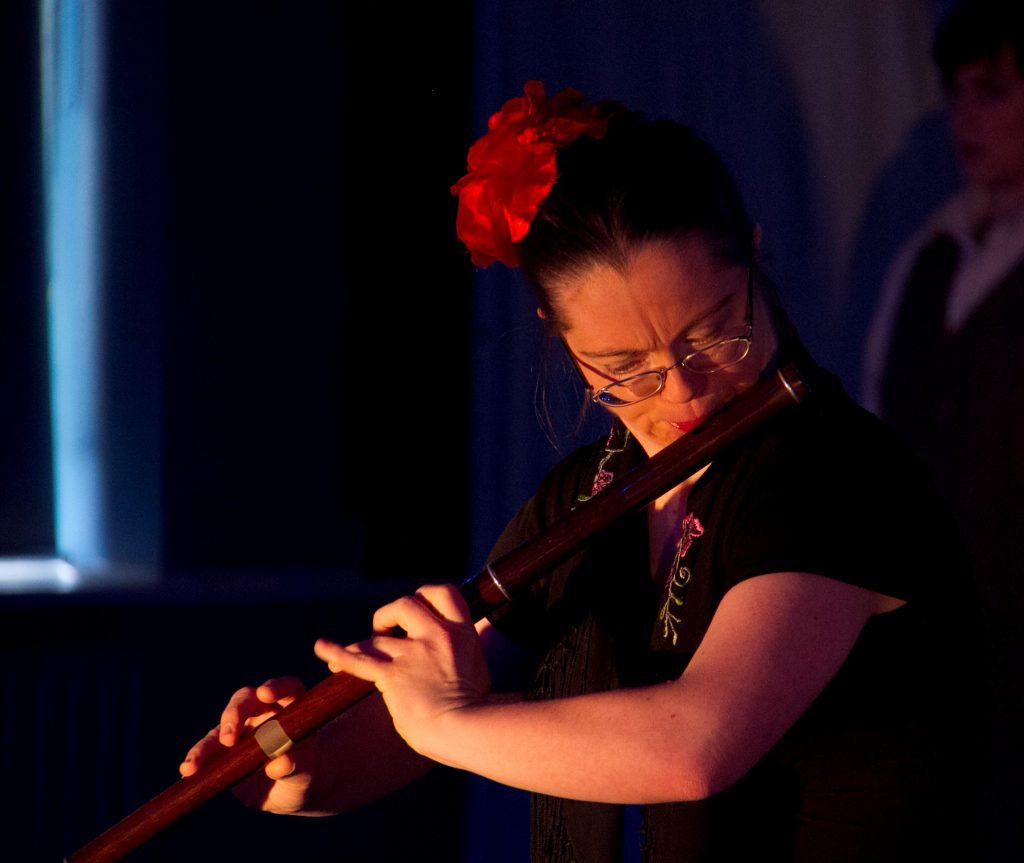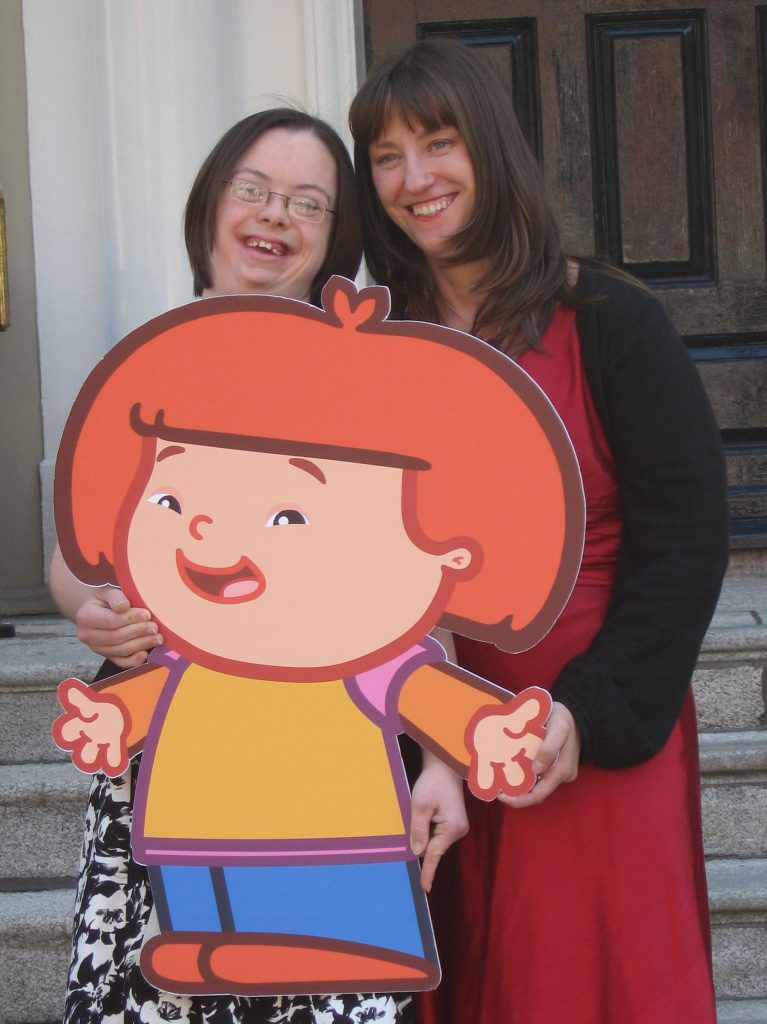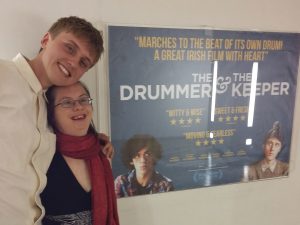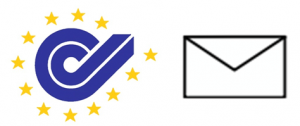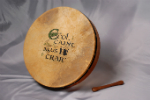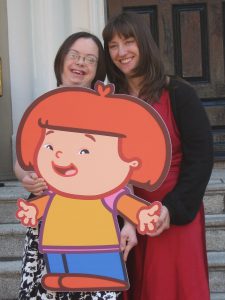Click here for the easy-to-read version
#30yearsofInclusion – Inclusion Europe turns 30 in 2018!
To mark this year, we will be highlighting and celebrating inclusion in Europe in its various forms and practices – and the people behind it.
Every month we will present one person who has brought the Inclusion movement forward in Europe.
Our Inclusion Heroine in February is Aimée Richardson.
She plays six instruments, has done voice over work for a famous Irish cartoon and is part of a group competing at a popular talent show on TV: Aimée Richardson from Ireland has an impressive CV, and her work certainly is an example for what people with intellectual disabilities can achieve when they get fully included in the field of their choice. We asked Aimée about her experiences in the entertainment industry, her trips to Moscow and St. Petersburg for the International Disability Film Festival – and about what needs to change so more people with disabilities can follow in her footsteps!
What are the instruments you play?
I play several instruments: the harp, the ukulele and the flute, plus some specific Irish instruments: the tin whistle, the low whistle and the bodhrán, which is a sort of frame drum.
How did you get interested in playing all these instruments?
I’ve always loved music– right from the first xylophone that I started with when I was very small. Playing the xylophone developed my musical ear and that was useful for learning other instruments.
My mum taught me the tin whistle and from there on, I got more involved with Traditional Irish music. I’ve become a keen musician and music is a big part of my life: I’ve played with popular Traditional Irish groups and create my own compositions.
What do you like about your instruments?
I love each one for its different sound.
The harp is beautiful … it’s difficult to play but I’m keen to learn.
I’m most fluent with the tin-whistle and I love it: It’s a small instrument, I can play it anywhere, but it has a powerful sound. It can easily get a theatre full of people hopping around!
Together with the Dublin Ukulele Collective, you took part in the talent show “Ireland’s Got Talent”. How did you like the experience?
It was exciting! For me it was the first time taking part in a competition. We always enjoyed dressing up brightly for our performances, we had our hair and make-up done – everybody loved it! But it was also hard work, and we spent a lot of time with rehearsals and practising the chords and the lyrics. It was a big thrill to learn that we got through to the next stage of Ireland’s Got Talent – this part will now be televised!
You did voice over work for the TV series Punky, the first cartoon with a lead character that has Down’s Syndrome. What was it like when the TV show became so famous in Ireland?
It was great! I was asked to do a lot of interviews for radio, TV and newspapers. Twice I was invited on a popular Saturday night talk show. Afterwards some people even recognized me in the street. When Punky was nominated for an award at the IFTAs (Irish Film and Television Awards), I was invited to the ceremony together with the director and the screenplay writer. It was very glamorous, with a red carpet and all. I was lucky enough to meet a lot of TV and movie stars!
You went to the International Disability Film Festival twice, organised by our Russian member Perspektiva …
Yes, I went to Moscow in 2014 and to St. Petersburg 2017.
… what did you like most about the festivals?
I really enjoyed watching all kinds of films from all over the world. And I made a lot of new friends!
“Punky” was shown to an audience of Russian children, and they were so enthusiastic… I answered some of their questions afterwards.
In Moscow, “Punky” was awarded the prize for the “Best Children’s Film”. And I was invited to play the whistle and the flute at the closing ceremony!
You are currently studying at the Blue Diamond Drama Academy, an initiative that aims to include adults with learning disabilities within mainstream art projects. …
Yes, I’m in my 2nd year now – and I love it!
… what do you learn at the Academy?
I learn many different things: how to properly warm up your voice, how to recite monologues, dancing and so on, but we also study classical playwrights like Shakespeare. This course is specifically aimed at students with intellectual disabilities, and as it happens we all have Down’s Syndrome. Currently I’m working on pantomime and slapstick comedy. We are also writing and devising a play based on our personal experiences in relationships!
You have a lot of experience in the film industry. What do you think needs to change so more people with intellectual disabilities can be actors?
First, there should be more support in mainstream colleges for people with intellectual disabilities to take courses in acting and theatre studies. Tutors need more education to know how to work with people with intellectual disabilities and adapt to their learning needs.
But if we want people with disabilities to be more represented in movies, more roles must be written for them, which is a task for screenplay writers. Finally casting directors should take more risks and cast people with disabilities more often. After all, people with disabilities are creative, reliable and dedicated!
What are your plans for the future?
I would like to become a permanent part of a full-time theatre company to develop my acting and maybe some directing. Perhaps I will find some way to combine acting with my musical talents. I recently had a small part in a brilliant movie – “The Drummer & The Keeper”. From that experience, I’d love to do more acting in front of camera. Maybe there’ll also be more voice-over work!
As a musician, I would love to have a chance to perform with professional traditional Irish musicians. I’ve played whistle duets with Paddy Moloney and some of my other favourites are Sharon Shannon, Martin Hayes, Mairtín O’Connor, Liam O’Maonlai and many others! I would also be thrilled to hear them play some of my own compositions!
See here some videos of Aimée Richardson playing her instruments:
Our Inclusion Heroine of January was self-advocate Elisabeta Moldovan from Romania. Read more:
“I experienced a lot of abuse in institutions. I wanted to change this situation for others.”
Find all our anniversary news on social media by following #30yearsofInclusion on Facebook and Twitter
Flavours of European inclusion: celebrating 30 years of learning, working and achieving together
At Inclusion International’s World Congress, Inclusion Europe will celebrate its 30th anniversary with a special event.
Inclusion Europe members will present not only their country’s food, culture and customs, but also their inclusion achievements during the last 30 years at tables spread across the room.
Participants are invited to discover stories, pictures and objects illustrating how the inclusion movement has moved forward during the last three decades, while tasting delicious national specialties and making new connections.
They will learn about successful practices of European collaboration for inclusion and about partnerships national members have formed with companies, government agencies and donors.
We will end the anniversary event in style: with a toast and a little surprise.
Afterwards, participants can join the World Congress party.
Register here for the World Congress
Would you like to receive more news like this? Subscribe!

Easy-to-read version
Click on a word which is in bold to read what it means.
There need to be more people with disabilities in the media!
Inclusion Europe turns 30 years old in 2018.
We are celebrating this in a special way:
We are looking at what has been done in Europe
to make sure people are included.
Every month we will talk about one person
who has worked towards inclusion in Europe.
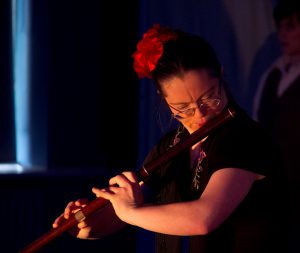
Our Inclusion Hero in February is Aimée Richardson.
Aimée Richardson is from Ireland,
and has done a lot of great things.
She plays 6 instruments and
has done the voice for a famous Irish cartoon.
She is part of a group in a talent show on TV.
Her work shows what people with intellectual disabilities
can do when they are fully included.
We asked Aimée about her work,
and what needs to change so more
people with disabilities can do work like her.
What instruments do you play?
I play lots of instruments, including
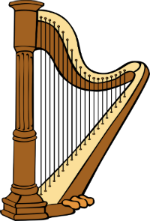
- the harp,
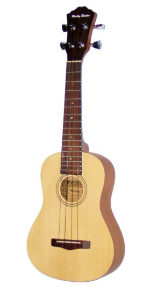
- the ukulele,
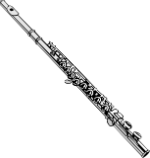
- and the flute.
I also play some traditional Irish instruments, such as:
- the tin whistle
- the low whistle
- and the bodhrán, which is a sort of drum.
How did you get interested in playing all these instruments?
I have always loved music, since my first instrument,
which was a xylophone.
Through playing the xylophone, I developed my musical skills.
My mum taught me the tin whistle.
This started my interest in traditional Irish music.
Music is a big part of my life.
I have played in groups and written my own music.
What do you like about your instruments?

I love all of them for their different sounds.
The harp is beautiful.
It is hard to play but I want to learn.
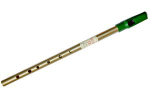
I find the tin whistle is the easiest to play.
I love it.
It is small, so it can be played anywhere.
It has a strong sound.
It gets people dancing.
You took part in the talent show, Ireland’s Got Talent,
as part of a group.
How did you find it?
It was exciting!
It was the first time I took part in a competition.
We enjoyed dressing up.
We had our hair and make up done.
But it was also hard work.
We practised a lot.
We were very pleased to get through to the next stage of the competition.
It will be shown on TV!
You did the voice for the TV series Punky.
Punky is the first cartoon with a main character who has Down’s Syndrome.
What was it like when Punky got so famous in Ireland?
It was great!
I did a lot of interviews for the radio, TV, and newspapers.
I went on a Saturday night TV show twice.
People knew who I was in public!
Punky was selected for the Irish Film and Television Awards.
The Irish Film and Television Awards is an event in Ireland
where people get awards for their work in film and TV.
I went with the people who helped make the cartoon.
I met lots of TV and movie stars.
You went to the International Disability Film Festival,
organised by our Russian member Perspektiva.
Yes, I went to the event in Moscow in 2014.
I also went to the event in St Petersburg in 2017.
What did you like most about the events?
I enjoyed watching lots of films from all over the world.
And I made new friends!
The cartoon Punky was shown to Russian children.
They liked it!
Afterwards, they asked me questions about it.
Punky won the Best Children’s Film prize in Moscow.
I played the whistle and the flute on the last day.
You are studying acting at college.
You are doing a course for young adults with learning disabilities.
Yes, I am in my 2nd year.
I love it!
What do you learn at the drama college?
I learn many different things.
For example,
- how to warm up my voice,
- perform long speeches,
- and dance.
We also study old theatre.
We are working on many projects.
For example, we are creating a play
based on our experiences in relationships.
What do you think needs to change so more
people with intellectual disabilities can be actors?
First, there needs to be more support
for people with intellectual disabilities to study acting.
Teachers need more training
to know how to work with people with intellectual disabilities.
More film roles need to be made for people with disabilities.
More people with disabilities should get roles.
People with disabilities have lots of talents!
What are your plans for the future?
I would like to be part of a theatre company
to develop my acting.
I would also like to help create more films.
Maybe I will find a way to mix my skills in acting and music.
I had a small part in a great movie
called The Drummer and The Keeper.
I learnt that I would love to do more acting in front of the camera.
Maybe I will do more voices for cartoons!
I would love to perform with more traditional Irish musicians.
I would also love to play my own music with them!
Here are some videos of Aimée playing her instruments:
Our Inclusion Hero in January was Elisabeta Moldovan. Read more.
Where applicable, all images of instruments are licensed under Creative Commons.
Find out about our birthday on social media by
clicking #30yearsofInclusion on Facebook and Twitter.
Celebrating 30 years of European inclusion
At the World Congress of Inclusion International,
Inclusion Europe will celebrate its 30th birthday with a special event.
Inclusion Europe’s members will talk about what they have done
for inclusion over the last 30 years.
They will also share their national foods and culture.
Participants will learn about how the members of Inclusion Europe
have worked together.
Participants will also learn about how the members of Inclusion Europe
have worked with other companies, governments and donors.
We will end the event in a special way: with a drink and a little surprise.
Afterwards, participants can join the World Congress party.
Register here for the World Congress.
Use the hashtag #LearnInspireLead on Facebook and Twitter.

My mum taught me the tin whistle.
This started my interest in traditional Irish music.
Music is a big part of my life.
I have played in groups and written my own music.
What do you like about your instruments?
I love all of them for their different sounds.
The harp is beautiful.
It is hard to play but I want to learn.
I find the tin whistle is the easiest to play.
I love it.
It is small, so it can be played anywhere.
It has a strong sound.
It gets people dancing.
You took part in the talent show, Ireland’s Got Talent,
as part of a group.
How did you find it?
It was exciting!
It was the first time I took part in a competition.
We enjoyed dressing up.
We had our hair and make up done.
But it was also hard work.
We practised a lot.
We were very pleased to get through to the next stage of the competition.
It will be shown on TV!
You did the voice for the TV series Punky.
Punky is the first cartoon with a main character who has Down’s Syndrome.
What was it like when Punky got so famous in Ireland?
It was great!
I did a lot of interviews for the radio, TV, and newspapers.
I went on a Saturday night TV show twice.
People knew who I was in public!
Punky was selected for the Irish Film and Television Awards.
The Irish Film and Television Awards is an event in Ireland
where people get awards for their work in film and TV.
I went with the people who helped make the cartoon.
I met lots of TV and movie stars.
You went to the International Disability Film Festival,
organised by our Russian member Perspektiva.
Yes, I went to the event in Moscow in 2014.
I also went to the event in St Petersburg in 2017.
What did you like most about the events?
I enjoyed watching lots of films from all over the world.
And I made new friends!
The cartoon Punky was shown to Russian children.
They liked it!
Afterwards, they asked me questions about it.
Punky won the Best Children’s Film prize in Moscow.
I played the whistle and the flute on the last day.
You are studying acting at college.
You are doing a course for young adults with learning disabilities.
Yes, I am in my 2nd year.
I love it!
What do you learn at the drama college?
I learn many different things.
For example,
- how to warm up my voice,
- perform long speeches,
- and dance.
We also study old theatre.
We are working on many projects.
For example, we are creating a play
based on our experiences in relationships.
What do you think needs to change so more
people with intellectual disabilities can be actors?
First, there needs to be more support
for people with intellectual disabilities to study acting.
Teachers need more training
to know how to work with people with intellectual disabilities.
More film roles need to be made for people with disabilities.
More people with disabilities should get roles.
People with disabilities have lots of talents!
What are your plans for the future?
I would like to be part of a theatre company
to develop my acting.
I would also like to help create more films.
Maybe I will find a way to mix my skills in acting and music.
I had a small part in a great movie
called The Drummer and The Keeper.
I learnt that I would love to do more acting in front of the camera.
Maybe I will do more voices for cartoons!
I would love to perform with more traditional Irish musicians.
I would also love to play my own music with them!
Here are some videos of Aimée playing her instruments:
Our Inclusion Hero in January was Elisabeta Moldovan. Read more.
Find out about our birthday on social media by
clicking #30yearsofInclusion on Facebook and Twitter.
Celebrating 30 years of European inclusion
At the World Congress of Inclusion International,
Inclusion Europe will celebrate its 30th birthday with a special event.
Inclusion Europe’s members will talk about what they have done
for inclusion over the last 30 years.
They will also share their national foods and culture.
Participants will learn about how the members of Inclusion Europe
have worked together.
Participants will also learn about how the members of Inclusion Europe
have worked with other companies, governments and donors.
We will end the event in a special way: with a drink and a little surprise.
Afterwards, participants can join the World Congress party.
Register here for the World Congress.
Use the hashtag #LearnInspireLead on Facebook and Twitter.[:]


